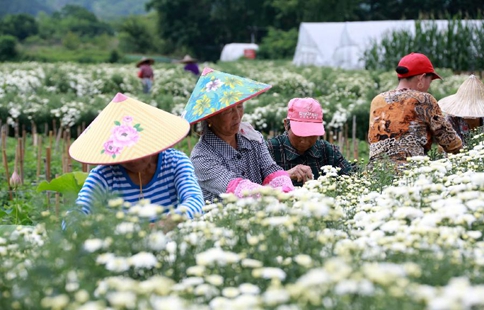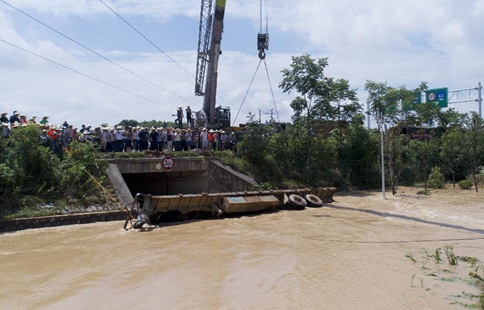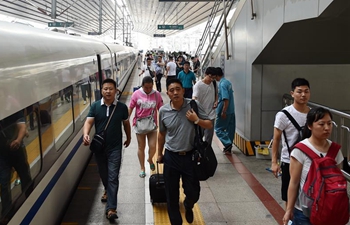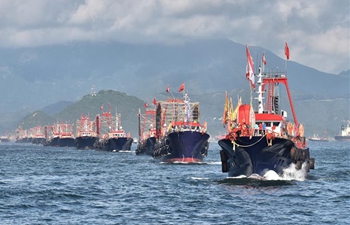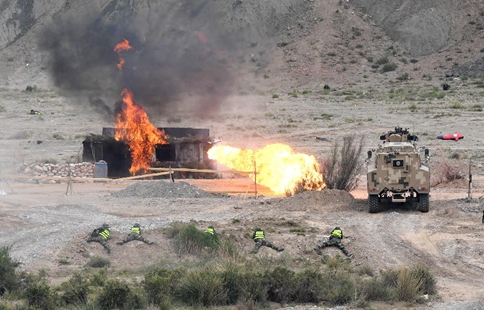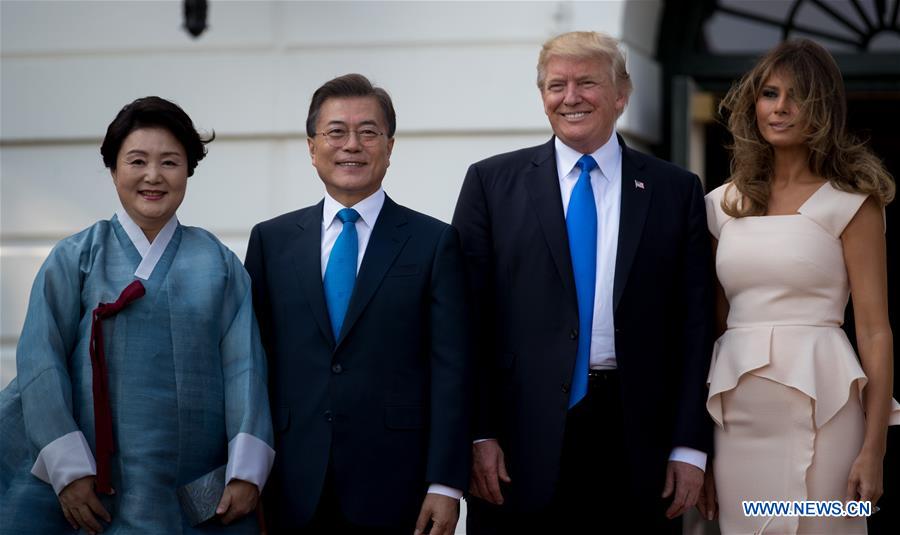
U.S. President Donald Trump (2nd R) and First Lady Melania Trump (1st R) welcome South Korean President Moon Jae-in (2nd L) and his wife Kim Jung-sook at the South Portico of the White House in Washington D.C., the United States, June 29, 2017. (Xinhua/Ting Shen)
SEOUL, July 1 (Xinhua) -- The first summit meeting in Washington between visiting South Korean President Moon Jae-in and U.S. President Donald Trump brought a "significant success" to the new South Korean leader, local media reports and experts said as the two leaders were in harmony to tackle Korean Peninsula nuclear issue.
The summit meeting, which lasted from Thursday to Friday local time, left some of issues unresolved, such as whether to renegotiate a 2012 free trade pact between the two countries and whether to increase the costs for U.S. forces stationed in South Korea.
"It was a significant success," Bong Young-shik, a research fellow at Yonsei Institute for North Korean studies in Seoul, told Xinhua Saturday, referring to the new South Korean leader's first face-to-face talks with the U.S. president since he took office on May 10.
According to the joint statement released after the bilateral meeting, Trump supported South Korea's "leading role" in fostering an environment for peaceful reunification of the Korean Peninsula.
Moon and Trump agreed that the door to dialogue with the Democratic People's Republic of Korea (DPRK) remained open "under the right circumstances" and that sanctions on Pyongyang were a "tool of diplomacy" to bring the country back to the dialogue table.
The six-party talks to dismantle the Korean Peninsula nuclear issue, which involves the Korean Peninsula, China, the United States, Russia and Japan, have been suspended since late 2008.
The researcher at Yonsei Institute said President Moon delivered a message that he would pursue peace in his DPRK policy based on a firm security alliance with the United States, shrugging off concerns among the conservative bloc in South Korea and a part of U.S. experts and politicians that Moon may adhere solely to dialogue with the DPRK.
Late President Roh Moo-hyun, for whom Moon had served as a chief of staff in Roh's presidency, and late President Kim Dae-jung, Roh's predecessor, advocated a so-called Sunshine Policy of trying to enhance inter-Korean relations through economic cooperation and personnel exchanges.
Moon was widely forecast to inherit the Sunshine Policy, but his comments, made in the joint press conference in Washington, indicated no big difference in Moon's stance on the DPRK and those from his conservative predecessors, Bong said.
The stance meant no acceptance of the DPRK as a nuclear state and putting a significant importance on security alliance with the United States to defend against the DPRK's nuclear and missile threats.
The summit meeting was successful for Trump as he took issue with the 2012 U.S.-South Korea free trade agreement, which Trump claimed during the joint press conference had caused the trade imbalance with South Korea.
Trade in goods and services between the two countries reached 144 billion U.S. dollars in 2016, with the U.S. running a deficit of 17 billion dollars. On his campaign trail, Trump had denounced the bilateral trade pact for one of reasons for a growing U.S. trade deficit.
Bong said Trump took this opportunity to demand the renegotiation of the free trade agreement with South Korea in a bid to deliver a message to "domestic audience," saying he was honoring his election pledges.
In contrast, taking issue with the free trade deal was a blow to President Moon. Some of South Korean experts said the trade imbalance between the two countries failed to include South Korea's imports of U.S. weapons, which was estimated at billions of dollars per year.
Trump also harkened back to his election campaign demand to urge South Korea to pay more for about 28,000 U.S. troops stationed in South Korea, dealing a blow to the new South Korean president.
The bilateral negotiations on costs for the U.S. military presence in South Korea will be renewed in the near future for the next five-year period beginning from 2019.
South Korea's main opposition Liberty Korea Party said in a commentary that numerous hardships facing the Moon government were confirmed as President Trump repeatedly emphasized the renegotiations on the bilateral FTA and the increased South Korean payment for the U.S. Forces Korea (USFK).
The centrist People's Party said the summit meeting left various issues unresolved, including the FTA renegotiation and the increased costs for the U.S. military presence in South Korea.
Despite the discord, Bong said, the first summit meeting between the two leaders was successful as they established a personal bond and exchanged impressions as a reliable partner with each other.
Bong said the main goal of the summit was to share their philosophy and vision on a broad range of issues, adding that detailed discussions on the FTA renegotiations, the Korean Peninsula nuclear issue and the burden-sharing for the USFK would be made among working-level officials and ministers later on.




